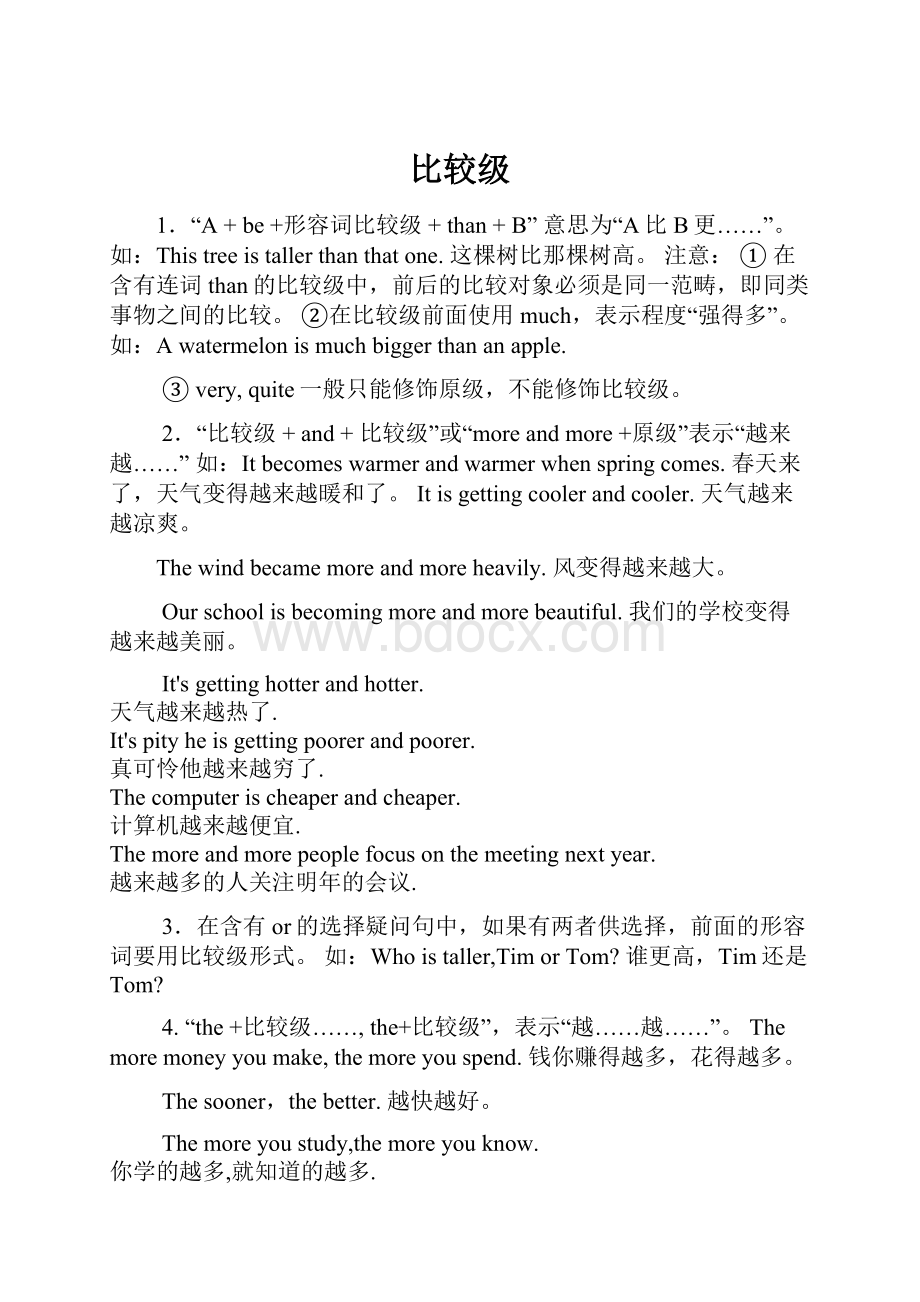比较级.docx
《比较级.docx》由会员分享,可在线阅读,更多相关《比较级.docx(7页珍藏版)》请在冰豆网上搜索。

比较级
1.“A+be+形容词比较级+than+B”意思为“A比B更……”。
如:
Thistreeistallerthanthatone.这棵树比那棵树高。
注意:
①在含有连词than的比较级中,前后的比较对象必须是同一范畴,即同类事物之间的比较。
②在比较级前面使用much,表示程度“强得多”。
如:
Awatermelonismuchbiggerthananapple.
③very,quite一般只能修饰原级,不能修饰比较级。
2.“比较级+and+比较级”或“moreandmore+原级”表示“越来越……”如:
Itbecomeswarmerandwarmerwhenspringcomes.春天来了,天气变得越来越暖和了。
Itisgettingcoolerandcooler.天气越来越凉爽。
Thewindbecamemoreandmoreheavily.风变得越来越大。
Ourschoolisbecomingmoreandmorebeautiful.我们的学校变得越来越美丽。
It'sgettinghotterandhotter.
天气越来越热了.
It'spityheisgettingpoorerandpoorer.
真可怜他越来越穷了.
Thecomputerischeaperandcheaper.
计算机越来越便宜.
Themoreandmorepeoplefocusonthemeetingnextyear.
越来越多的人关注明年的会议.
3.在含有or的选择疑问句中,如果有两者供选择,前面的形容词要用比较级形式。
如:
Whoistaller,TimorTom?
谁更高,Tim还是Tom?
4.“the+比较级……,the+比较级”,表示“越……越……”。
Themoremoneyyoumake,themoreyouspend.钱你赚得越多,花得越多。
Thesooner,thebetter.越快越好。
Themoreyoustudy,themoreyouknow.
你学的越多,就知道的越多.
ThemoreIhave,themoreIwant.
我越有就越想要有.
Themore,thebetter.
越多越好.
5.表示倍数的比较级用法:
①.A+be+倍数+times+the+形容词对应名词形式+of+B.如:
Thenewbuildingisthreetimestheheightoftheoldone.这座新楼比那座旧楼高三倍。
(新楼是旧楼的四倍高)
②.A+be+倍数+times+as+原级+as+B.如:
AsiaisfourtimesaslargeasEurope.亚洲是欧洲的四倍大。
(亚洲比欧洲大三倍)
③.A+be+序数词+比较级+than+B.如:
Ourschoolistwicebiggerthanyours.我们学校比你们学校大两倍。
6.形容词、副词的最高级形式主要用来表示三者或三者以上人或事物的比较,表示“最……”的意思。
句子中有表示范围的词或短语。
如:
ofthethree,inourclass等等。
如:
Heisthetallestinourclass.他在我们班里是最高的。
7."否定词语+比较级","否定词语+so…as"结构表示最高级含义。
Nothingissoeasyasthis.=Nothingiseasierthanthis.=Thisistheeasiestthing.
8.比较级与最高级的转换:
Mikeisthemostintelligentinhisclass.Mikeismoreintelligentthananyotherstudentinhisclass
7.修饰比较级和最高级的词
1)可修饰比较级的词
①.abit,alittle,rather,much,far,byfar,many,alot,lots,agreatdeal,any,still,even等。
②.还可以用表示倍数的词或度量名词作修饰语。
③.以上词(除byfar)外,必须置于比较级形容词或副词的前面。
注意:
使用最高级要注意将主语包括在比较范围内。
(错)Tomisthetallestofhisthreebrothers.
(对)Tomisthetallestofthethreebrothers.
2)下列词可修饰最高级:
byfar,far,much,mostly,almost。
Thishatisnearly/almostthebiggest.注意:
a.very可修饰最高级,但位置与much不同。
Thisistheverybest.Thisismuchthebest.
b.序数词通常只修饰最高级。
Africaisthesecondlargestcontinent.
8.要避免重复使用比较级。
(错)Heismoreclevererthanhisbrother.
(对)Heismorecleverthanhisbrother.
(对)Heisclevererthanhisbrother.
9.要避免将主语含在比较对象中。
(错)ChinaislargerthatanycountryinAsia.
(对)ChinaislargerthananyothercountryinAsia.
10.要注意对应句型,遵循前后一致的原则。
ThepopulationofShanghaiislargerthanthatofBeijing.Itiseasiertomakeaplanthantocarryitout.
11.要注意冠词的使用,后有名词的时候,前面才有可能有冠词。
比较:
Whichislarger,CanadaorAustralia?
Whichisthelargercountry,CanadaorAustralia?
Sheistallerthanhertwosisters.Sheisthetallerofthetwosisters.
10.连用词much,alittle,abit,even
主语+谓语(系动词)+as+形容词原形+as+从句.表示两者对比相同.
Thisboxisasbigasmine.
这个盒子和我的一样大.
Thiscoatisascheapasthatone.
这件衣服同那件衣服一样便宜.
IstudyEnglishashardasmybrother.
我同我兄弟一样学习努力.
the+形容词表示某种人.
Healwayshelpsthepoor.
他经常帮助穷人.
Iliketohaveatalkwiththeyoung.
我喜欢同年轻人谈话.
Therichsometimescomplaintheiremptylife.
富人有时抱怨他们空虚的生活.
Thepoliceledtheoldmanacrossthestreet.
警察领老人横过马路.
比较级的用法
1.表示"比...更",用比较级形容词+than+比较成分,than后主词的述语动词往往省略,非正式用法的than后的人称代名词可用受格。
HeisyoungerthanI(am).
他比我年轻。
Iamabetterswimmerthanhe(him).
我游泳比他好。
2.表示"较...低;不及..."用less+原级形容词+than+比较成分。
Iamlessyoungthanhe(is).
我不比他年轻。
3.表示两者之中"较...",用the+比较级+ofthetwo。
Thisoneisthebiggerofthetwohouses.
这所房子是两座房子中较大的。
4.定冠词或指示形容词+比较级+名词表示比较。
ThetallerboyisJohn.
那个身材较高的男孩子是约翰。
5.有少数以ior结尾的形容词,如inferior(次于),junior(年幼的;下级的),posterior(之后),prior(之前),senior(年长的,上级的),superior(优于)等本身就有比较的意思,常与介系词to连用。
Thismethodissuperiortothatone.
这种方法优于那种方法。
6.比较形容词可以被副词如alittle(一点),much(得多),even(更加),still(更加),far(...的多)等修饰,但不可用very修饰。
中文:
现在的生活比二十年前的生活轻松得多了。
(误)Lifeisveryeasierthanitwastwentyyearsago.
(正)Lifeisverymucheasierthanitwastwentyyearsago.
较级特殊用法
1.nomore…than…与。
。
。
一样不。
。
。
notmore…than…没有。
。
。
那样。
。
。
,不如。
。
。
notless…than…不亚于。
。
。
2.morethan…不止,仅仅,非常,极其Thismorethansatisfiedme.
3.morethanalittle非常
4.notmorethan不多于no(notany)morethan不过,仅仅
5.nolessthan有。
。
。
之多,多达notlessthan至少,不下于
6.neithermorenorlessthan恰好,不多不少,简直,和。
。
。
完全一样
7.betterthan多于,超过Itisbetterthan20kmtothestation.
8.(in)lessthannotime立即,一会儿
9.(be)little/nobetterthan实际上,简直就是
10.nothinglessthan完全是,和。
。
。
一模一样
11.allthemore越发,更加
12.any(the)less较小/更小一些
13.allthebetter更好,更加
14.somuchthebetter/worse(forsb./sth.)甚至更好/更坏
15.goonebetter(thansb./sth.)胜过。
。
。
一筹
16.more…than…与其说。
。
。
不如说。
。
。
17.wouldsooner/rather…than与其。
。
。
宁愿
18.(be)morelike…than不象。
。
。
倒象
19.rather…than…/ratherthan宁可。
。
。
而不
20.otherthan除了。
。
。
,除。
。
。
之外
21.rather…thanotherwise不是别的而是
22.no/noneotherthan正是,除。
。
。
之外无其他
23.nomore不再,不复存在,也不,也没有
24.lessthan不。
。
。
25.moreoftenthanno经常,多半t
26.seemore/lessofsomeone更常/少见;再/少见到。
。
。
27.none+the+比较级毫不。
。
。
,毫无。
。
。
28.haveseenbetterdays(现在)情况转坏
29.thinkbetterofsth.改变。
。
。
的念头
30.forbetteror(for)worse无论好坏,同甘共苦
31.allthebetter因。
。
。
而更加
32.morethanmeetstheeye/ear另有隐情,并非表面那么简单的
Moreismeantthan,meetstheear.意在言外
Thereismore(toit)thanmeetstheeyes.现象背后有文章
1.单音节以及少数双音节形容词或副词大致按以下规律变化:
(1)一般在形容词或副词后面直接加–er变为比较级,加–est变为最高级。
如:
old—older—oldesthigh—higher—highest
(2)以重读闭音节结尾,且末尾只有一个辅音字母的,则双写最后一个辅音字母,再加-er变为比较级,加–est变为最高级。
如:
big—bigger—biggestthin—thinner—thinnest
(3)以“辅音字母+y”结尾的,则将改y为i再加-er变为比较级,加–est变为最高级。
如:
busy—busier—busiestheavy—heavier—heaviest
(4)以字母e结尾的,直接加–r变为比较级,加–st变为最高级。
如:
large—larger—largestfree—freer—freest
2.多音节以及某些双音节形容词或副词变为比较级或最高级时,则通常在其前加more变为比较级,加most变为最高级。
如:
important—moreimportant—mostimportant
difficult—moredifficult—mostdifficult
useful—moreuseful—mostuseful
3.少数单音节,特别是分词形容词,须在前面加more变为比较级,(the)most变为最高级。
如:
fond—morefond—mostfond
pleased—morepleased—mostpleased
4.有些的比较级或最高级有两种形式,如:
clever—cleverer/moreclever—cleverest/mostclever
able—abler/moreable—ablest/mostable
narrow—narrower/morenarrow—narrowest/mostnarrow
形容词的原级、比较级、最高级
big-bigger-biggest
thin-thinner-thinnest
strong-stronger-strongest
good好betterbest
bad坏的worseworst
much多(形容不可数名词)moremost
little少lessleast
many多(形容可数名词)moremost
farfartherfarthest远
farfurtherfurthest程度更高的,比如futhereducation高等教育
old老,年纪较长older/elderoldest/eldest
还要注意的是,一些三音节以上的形容词在比较级和最高级变形时,形容词不变形,在该词前加上more,most
如,
moreinteresting
tired----moretired,mosttired
fond-----morefond,mostfond
glad-----moreglad,mostglad
bored----morebored,mostbored
pleased----morepleased,mostpleased
good/well-------better,best
bad/badly/ill------worse,worst
many/much-------more,most
little------less,least
far----farther,farthes/firther,furthest
old----older,oldest(GA)
----older,oldest/elder,eldest(GB)
cruel-----crueler,cruelest/
morecruel,mostcruel
strict----stricter,strictest/
morestrict,moststrict
often-----oftener,oftenest/
moreoften,mostoften
friendly------friendlier,friendliest/
morefriendly,mostfriendly
clever-----cleverer,cleverest/
moreclever,mostclever